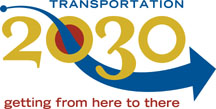Transportation
2030: MTC Wants Your Good Ideas
 By
Brenda Kahn, MTC Senior Public Information Officer
By
Brenda Kahn, MTC Senior Public Information Officer
It doesnít have the pizzazz of
TVís "Star Search," but the Project Search sponsored by
the Bay Areaís Metropolitan Transportation Commission (MTC)
nonetheless is worth tuning in to. As part of the public
participation process for its Transportation 2030 Plan, MTC
is inviting residents to submit creative ideas for taming traffic,
upgrading public transit, enhancing travelersí safety, and raising
the regionís overall livability quotient.
The Transportation 2030 Plan
will be a blueprint to guide transportation development in the
nine-county San Francisco Bay Area over the next 25 years. MTC
expects approximately $100 billion to be available for
transportation investments in the region during that timeframe.
While the vast bulk of that funding will be devoted to keeping
current infrastructure in good health and smooth functioning, the
region will need to make strategic transportation investments to
keep pace with anticipated growth in population and jobs. Falling
into this category are projects to improve the connectivity of the
regional public transit network, new technologies that can squeeze
more capacity out of existing facilities, and projects to close gaps
in the regionís web of carpool lanes. In the realm of smart growth
and livability, planners are looking to make the built environment
more hospitable to pedestrians, bicyclists, and transit riders.
"This is the first time in
our 30-plus-year history that MTC is going directly to the public
and transportation activists to solicit actual project ideas,"
said MTC Chair Steve Kinsey. "People tend to feel passionate
about ways of improving their personal commute, and their ideas for
making the Bay Area a better place to live. We want to harness that
energy and those creative ideas for the common good."
To be eligible for consideration,
projects must meet certain thresholds. In fact, the project must
have significant community and/or regional impacts and a total cost
of $5 million or higher. "Weíre looking for something larger
than a single stoplight at a specific corner," Kinsey said.
"On the other hand, we might consider installing a string of
traffic control devices and new technologies along a prime arterial
to turn it into a smart corridor."
Projects selected for evaluation
must meet a series of additional screening criteria, including the
following:
∑Submittals must consist
of a specific project or transportation program rather than a broad
policy.
∑The project must be
defined in enough detail to generate data about its impact.
∑The project should not
replace a project already in the current regional transportation
plan.
∑The project may not have
been rejected in a recent major transportation study.
∑The project must have
total costs that are in reasonable proportion to anticipated
funding.
∑The project should have a
reasonable guarantee of operating funds.
∑The project should not
cause undue harm to the environment.
∑The project can be funded
or implemented without a change in law or regulations.
Simultaneous with tapping the
publicís ideas, MTC is soliciting project nominations from the
nine-county congestion management agencies. Following a technical
analysis, MTC intends to issue the draft Transportation 2030 Plan
for public review by the fall of 2004.
The deadline for project
submittals is September 17, 2003. An interactive form on the
Transportation 2030 Web site (www.mtc.ca.gov/T2030) makes it easy to
submit projects. For questions, e-mail
info@mtc.ca.gov,
or call 510/464-7787.